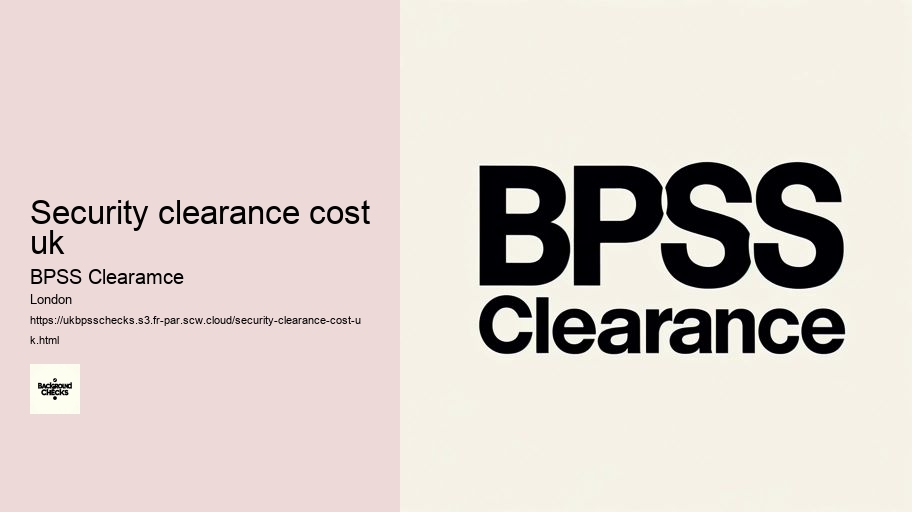
Procurement officers in government departments handle large-scale purchases and contracts that can have significant financial implications. BPSS clearance is essential to prevent corruption and ensure these roles are filled by individuals who are beyond reproach.
The right to work check under BPSS serves as a legal safeguard that prevents illegal employment.
To guarantee your suitability for BPSS clearance, gather the necessary verification documents, including proof of right to work in the UK and identity verification papers such as a passport or driver's license. These documents are essential for confirming your eligibility and identity during the clearance process.
Organizations that implement BPSS clearance as part of their security protocols benefit from a standardized approach to vetting that is recognized across various sectors. This standardization helps in maintaining a consistent security posture regardless of the specific nature or location of the job.
While the typical duration for a BPSS check ranges from two weeks to a month, it's important for both employers and candidates to be prepared for variations based on the factors discussed. Employers should manage expectations and provide candidates with as much information as possible about what to expect during the BPSS clearance process to ensure a smooth and efficient vetting experience.
For individuals seeking BPSS clearance, organizations may conduct additional inquiries to explore further into various aspects of their background and history. These additional investigations could involve checks on overseas travel history for periods exceeding 6 months within the last 3 years.

A criminal record check is conducted to ascertain if the individual has any convictions that might be relevant to their suitability for the position. For BPSS checks, this usually involves a basic disclosure that reveals unspent convictions, providing an insight into the individual's legal compliance and integrity.
DBS checks, on the other hand, are regulated by the Home Office and are designed to prevent unsuitable people from working with vulnerable groups. The DBS also maintains barred lists which prevent individuals who pose a known risk from working with children or vulnerable adults, something not covered by BPSS checks.
The legal underpinning of BPSS clearance in the UK, though not defined by a single piece of legislation, is supported by a variety of laws and regulations that govern national security, data protection, and employment. This legal framework ensures that BPSS checks are conducted in a manner that is secure, ethical, and compliant with the broader objectives of national security and public safety.
In contrast, DBS checks might need to be renewed more frequently, especially for positions involving regular contact with vulnerable groups.
What Is the Difference Between Bpss and Dbs? When distinguishing between BPSS and DBS checks, it's vital to recognize that BPSS focuses on national security vetting, identity verification, and right to work status, while DBS solely examines an individual's criminal record.
Coordinating with overseas authorities for document verification and background checks adds another layer of difficulty, extending the time required for completion. Addressing inconsistencies or gaps in the information provided by the individual undergoing BPSS clearance may necessitate additional time and effort to resolve.


The use of digital platforms in the BPSS process facilitates better communication and document management. Candidates can upload necessary documents directly through secure online portals, which are immediately accessible to HR departments and vetting personnel. This eliminates the delays associated with physical mailing and reduces the risk of documents being lost or mishandled.
Baseline Personnel Security Standard (BPSS) checks and BS7858:2019 checks are both integral to pre-employment vetting in the UK, but they serve different purposes and are structured to meet the needs of different sectors. BPSS is the standard background check required primarily for government employees and contractors to ensure they meet certain standards of trustworthiness and reliability. In contrast, BS7858:2019 is a specific British Standard providing detailed guidelines for the screening of individuals working in secure environments, often within the private sector, such as security and alarm system services.
Checking criminal records focuses on unspent convictions, evaluating an individual's trustworthiness. Confirming employment history validates the accuracy and truthfulness of the past three years of work or activity.
The BPSS clearance process also assesses the nationality and immigration status of the applicant, confirming their eligibility to work in the UK. This step is essential not only for legal compliance but also for ensuring the reliability of the workforce in sensitive or security-related roles. It helps prevent the employment of individuals who might have restrictions that could impact their suitability for specific duties.
In summary, while BPSS checks provide a security baseline for individuals primarily working within or for the UK government, DBS checks serve to protect vulnerable groups from potential harm. Both types of checks are crucial, yet they serve different and complementary purposes within the spectrum of employment background screenings in the UK. Organizations must understand the differences to ensure they are implementing the correct type of check for their specific needs.
Adhere to the Baseline Personnel Security Standard (BPSS) clearance process to gain authorized access to UK OFFICIAL Assets. To guarantee you meet the necessary requirements for accessing these assets, consider the following:

DBS checks are available in three levels: Basic, Standard, and Enhanced. Each level provides a different depth of information, with Enhanced DBS checks including checks against the barred lists and additional information held by local police that’s relevant to the role being applied for. This is more comprehensive compared to the simpler criminal record check involved in BPSS.
When undergoing a BPSS check, you're subjected to a thorough screening process to confirm your trustworthiness and eligibility for accessing sensitive information. This screening, which is a baseline personnel security standard in the UK, includes checks like Basic DBS Check, ID Check, Right to Work check, and 3-Year Employment History Check.
Alongside these, national identity cards or residence permits may also be accepted to establish your identity accurately. It's imperative to make sure that the identification documents you provide are original, unexpired, and legitimate.
BPSS stands for "Baseline Personnel Security Standard." It's essentially a basic level of security clearance required for individuals working in roles that involve access to sensitive information or facilities, especially in the public sector. The BPSS checks typically include identity verification, employment history checks, and criminal record checks.
No, BPSS (Baseline Personnel Security Standard) and DBS (Disclosure and Barring Service) are not the same.
BPSS (Baseline Personnel Security Standard): This is a set of government guidelines in the United Kingdom for ensuring the security clearance of individuals working with sensitive information or in certain roles. It is a basic level of security clearance and involves checks such as identity verification, employment history, and criminal record checks. BPSS is often required for roles in both the public and private sectors where access to sensitive information or facilities is involved.
DBS (Disclosure and Barring Service): This is a government agency in the UK that performs checks on individuals working with children or vulnerable adults. The DBS conducts criminal record checks (previously known as CRB checks) to help organizations make safer recruitment decisions by identifying candidates who may be unsuitable for certain roles due to past criminal convictions, cautions, reprimands, or warnings.
While both BPSS and DBS involve background checks, they serve different purposes and are used in different contexts. BPSS focuses on security clearance for a broader range of roles, including those involving access to sensitive information, while DBS specifically focuses on roles involving work with vulnerable groups.
The Baseline Personnel Security Standard (BPSS) checks typically include:
Identity Verification: Verifying the identity of the individual through official documents such as passports, driver's licenses, or other government-issued identification.
Employment History Checks: Verifying the individual's employment history to ensure accuracy and assess their suitability for the role.
Criminal Record Checks: Checking for any criminal convictions or cautions. This is often done through a Basic Disclosure from the Disclosure and Barring Service (DBS) in England and Wales, Disclosure Scotland in Scotland, or AccessNI in Northern Ireland.
Verification of Address: Verifying the individual's current and previous addresses to ensure accuracy and completeness of their background information.
These checks are aimed at establishing a baseline level of trustworthiness and suitability for individuals working in roles that require access to sensitive information or facilities, particularly within the public sector but also in some private sector positions.
A valid proof of address for a Baseline Personnel Security Standard (BPSS) check typically includes official documents that clearly display the individual's name and current address. Common examples of acceptable proof of address documents may include:
Utility Bills: Recent bills for services such as electricity, gas, water, or landline phone, issued within the last three to six months.
Bank Statements: Recent bank statements, typically issued within the last three to six months, showing the individual's name and address.
Official Letters: Letters from government agencies, local authorities, or financial institutions, such as tax statements, council tax bills, or letters from the Department for Work and Pensions (DWP), which display the individual's name and address.
Tenancy Agreements: A signed and dated rental or lease agreement for accommodation, showing both the tenant's and landlord's details, along with the property address.
Mortgage Statements: Statements from a mortgage provider showing the individual's name and property address, issued within the last three to six months.
It's important to note that the specific requirements for proof of address may vary depending on the organization conducting the BPSS check. Additionally, the document should be recent and not expired, and it should clearly display both the individual's name and current address.
A Baseline Personnel Security Standard (BPSS) check is typically required for individuals working in roles that involve access to sensitive information or facilities, particularly within the public sector but also in some private sector positions. While specific requirements may vary depending on the organization and the nature of the role, BPSS checks are commonly needed for individuals who:
In summary, individuals who require a BPSS check are those whose roles involve a level of trust, responsibility, and access to information or facilities that necessitate verification of their identity, employment history, and suitability for the position.
The Baseline Personnel Security Standard (BPSS) does not have an expiry date like some other security clearances. Instead, it serves as a foundational level of security clearance that establishes an individual's baseline trustworthiness and suitability for roles requiring access to sensitive information or facilities.
However, while the BPSS itself does not expire, organizations may have their own policies regarding the periodic review or renewal of security clearances for their employees. For instance, some employers may require employees to undergo regular rechecks or refreshes of their background checks, including BPSS checks, to ensure that their security clearance remains up to date.
Therefore, although the BPSS clearance itself doesn't have a fixed duration, individuals and organizations should be aware of any policies or requirements related to maintaining and updating security clearances in accordance with best practices and organizational guidelines.